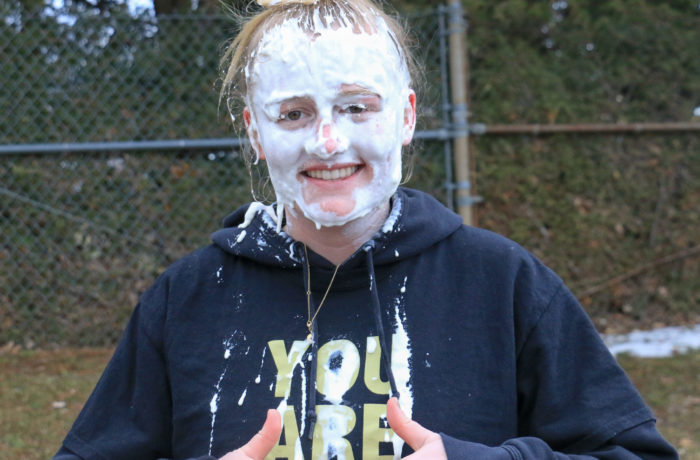
By Katherine Martin
Executive Editor
It’s 17 degrees but coats are left at home this Saturday night. Alcohol serves as a buffer to the cold while students wait in line at Rasputin’s, a bar at the end of Church Street. Underclassmen recite zip codes to themselves, praying the bouncer believes their age. Inside, fellow students are opening tabs and ordering the bar’s infamous “trash can,” an $8 drink made up of five different liquors and Red Bull.
Back at school, the townhouses are relatively quiet. Multiple houses have small gatherings and underclassmen roam campus, searching for the best one to join. Students take a break and stop at the grill for some food and warmth. By 1 a.m., campus is quiet.
The 300s are not what they used to be. Once packed with students of all grades, “Sputies,” a bar downtown has taken the lead as the new weekend hub and students point to Public Safety.
Three years ago, the vast majority of students drinking stayed on campus on weekend nights. Today, it’s barely a fraction of that number. Public Safety says that they’ve seen a decrease in problems associated with parties and they’re pleased. Students say that to avoid Public Safety’s crackdowns of recent years, they’ve taken their weekend partying to another location… downtown Burlington.
“Freshman year was a given we were staying on campus to drink,” said Brendan Morris ’19. “Now the script is completely flipped. Everyone goes downtown. Friday and Saturday we usually hang out at our house until 11 p.m. and then go right to Sputies. If we don’t kick everyone out of our house ourselves, Public Safety will.”
The new trend started a few years ago. During the 2016-17 school year, one year into Douglas Babcock’s role as director of Public Safety, the public safety team began enforcing the townhouses’ 45-person maximum capacity rule. This fire safety code, applicable to all townhouses, is the most common reason for parties to get shut down, Babcock said.
This means that anyone having a party needs to staff the front and back doors to make sure there are no more than 45 people at any time in the townhouse, a difficult rule to enforce in a townhouse that can easily fit many more.
“They were only ever supposed to have 45 people in them max occupancy. This is a new approach to how we get people to comply with that,” Babcock said. “We’re not going to stand in front of every door to count the number of people coming in so that meant we can only stand at the door and count the number of people coming out.”
When Public Safety shuts down a party because they believe it is overcapacity, they stand at both doors and count the number of students leaving the house, in order to have an accurate number when writing the house up for overcapacity.
Students have been proactive about the capacity rule, often having two or more bouncers at both townhouse doors.
Some students are skeptical about the enforcement. “Most of the time they shut down a party they tell you it’s overcapacity,” said Justin Richmond ’20. “But they tell you some ridiculous number that you know isn’t even physically possible to have that many people in a house.”
Students have been encouraged since the 2016-17 school year to attend Thursday meetings with Residence Life to register their houses for weekend parties. The meetings get a regular turnout from students, eager to cooperate
“Last year I felt that registering was a really good idea and it was working out well. We almost actually never got in trouble and we hosted a lot of parties in the 3s,” said Laurenn Dedecko ’19. “This year even when we had registered, Public Safety showed up. We didn’t really have a fair warning. They bombarded our house and were kind of insulting and made us feel like they weren’t willing to work with us. We ended up on probation for overcapacity. They told us we had 90 people.”
For Dedecko, her probation meant no house parties for three weekends along with a fine of $100 per housemate who was present at the party. For others, probation can look like no parties until P-Day, April 27.
“We’re very conscious of the big weekends,” Babcock said. “We know that people want P-day so we usually start with a you’re suspended from hosting parties through P-Day and here’s how you can earn it back.”
While Jeff Vincent, assistant dean of students, said he believes that students who want to stay on campus will stay on campus, some seniors argue otherwise.
“Personally, I didn’t plan on going downtown every weekend but it’s the only option because otherwise we’re here and get fined or get in trouble,” Morris said. It’s going to be someone’s house [who gets fined] so I’m not paying for it.”
Seniors in townhouses, frustrated with Public Safety’s new enforcements, or fearful of facing another probation and fine, increasingly resort to downtown Burlington to go out. The higher cost of drinking off campus is one of the reasons students miss the drinking scene at school. The cost of ubers, drinks, and cover charges can be pricey. An uberX downtown (the safer option when drinking) typically looks like $20 or $4 per person on the way there. This cost added to a $3 cover charge, four $5 drinks at the bar, and a surcharged uber home of $40 adds up to a total of $37 in a night, without any drunk food.
“Financially I’d like to stay on campus but realistically there is no choice. We have to go to downtown if we want to have a fun and late night,” Dedecko said. On a recent night Dedecko spent $40 at Sputies alone, and came home at 2:30 a.m.
Where the upperclassmen go, the underclassmen follow. Townhouse residents choosing to drink off campus leaves underage students fewer options.
“Underage underclassmen go downtown as well, I mean that’s where all the fun is,” Morris said. “There’s not really much to be had here.”
“I prefer to stay on campus because I’m not 21 yet and would rather not have the stress of trying to get in to bars,” said Kaelyn Oliver ’20. “It’s also easier and cheaper to say on campus but I feel like I need a fake ID at St. Mike’s or else I’m left out of a lot of fun things. Underclassmen that have fake IDs typically get into the bars downtown easily.”
When there are parties on campus, the 45 capacity rule often leaves freshmen outside, unable to find a party to get into.
“Freshman year there was no question if we would get into the party,” Dedecko said. “I feel like I don’t even see underclassmen anymore which isn’t a bother but I feel bad for them.”
Dedecko believes that campus is generally a safer drinking environment and wants to see a shift in Public Safety’s actions. “I just think they need to be more open to kids being on campus and partying here because in reality it’s probably a safer environment for us to be here than roaming downtown,” Dedecko said.


